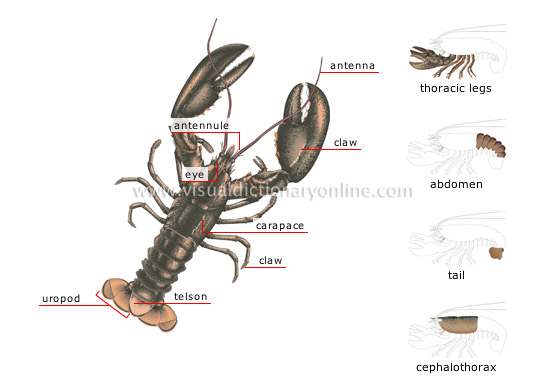morphology of a lobster
antennule 
Very short sensory organ covered with fine hairs and located in front of the head; it has an olfactory function.
claw 
Articulate appendage located at the terminal end of the first three pairs of legs; it has a prehensile, defensive and, more rarely, motor function.
claw 
Pointy hook-shaped structure attached to the terminal end of the two last pairs of thoracic legs.
uropod 
Articulated appendage attached to the last abdominal segment before the telson; it is formed of two lobes and helps the lobster to swim.
telson 
Terminal end of the body having no appendages; the anus is located on its ventral surface. It comprises the central part of the tail.
antenna 
Long sensory organ having a tactile function.
carapace 
Hard covering produced by folds of tissue from the back segments of the head; it protects the body of the lobster.
eye 
Organ of sight made up of several individual eyes positioned on a movable axis; adapted to low light conditions, it serves mainly to detect motion.
abdomen 
Posterior portion of the body formed of six segments and bearing the pleopods, articulated appendages used for swimming, circulating water over the gills and holding the eggs.
cephalothorax 
Meeting of the head and the thorax that forms the anterior portion of the body of the lobster.
thoracic legs 
Articulated limbs attached to the cephalothorax and having a prehensile and motor function; the first three legs bear pincer claws while the last two bear claws.
tail 
Swimming organ formed of the telson and the two uropods.











